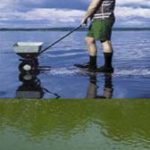INDIAN RIVER COUNTY — Washing our cars in our driveways is one of the most environmentally unfriendly chores. After all, that water is loaded with a witch’s brew of gasoline, oil, and residues from exhaust fumes — as well as the harsh detergents being used for the washing itself.
Unlike household wastewater that enters sewers or septic systems and undergoes treatment before it is discharged into the environment, what runs off from your car goes right into storm drains – and eventually into lakes, wetlands, or our Indian River Lagoon where it will poison aquatic life.
On the other hand, federal law in the U.S. requires commercial carwash facilities to drain their wastewater into sanitary sewer systems, so it gets treated before it is discharged back into the great outdoors. And commercial car washes use computer controlled systems and high-pressure nozzles and pumps that minimize water usage. Many reuse the rinse water.
If you must wash your car at home, choose a biodegradable soap specifically formulated for automotive parts. Or you can make your own biodegradable car wash by mixing one cup of liquid dishwashing detergent and 3/4 cup of powdered laundry detergent (each should be chlorine- and phosphate-free and non-petroleum based) with three gallons of water. This concentrate can then be used sparingly with water over exterior car surfaces.
This recipe can be found at http://scienceofeverydaylife.discoveryeducation.com/families/pdfs/activities/Green-Car-Wash-Challenge.pdf
Even when using green-friendly cleaners, it is better to avoid the driveway and instead wash your car on your lawn or over dirt so that the wastewater can be absorbed and neutralized in soil instead of flowing directly into storm drains or open water bodies. (If you don’t have a lawn, try parking on a gravel surface, where water can also percolate into the soil.)
One last caution: Kids and parents planning a fundraising car wash event should know that they might be violating clean water laws if runoff is not contained and disposed of properly. Some car wash facilities allow fundraisers to sell tickets redeemable at local car washes, enabling the organizations to still make money while keeping dry and keeping local waterways clean. If the group decides to do a fundraiser car wash the practices below need to be followed:
• Good Housekeeping Practice #1: Before beginning your car wash, remove all trash and debris from the car washing area.
• Good Housekeeping Practice #2: Use only soaps, cleaners, or detergents labeled “non-toxic”, “phosphate free”, or “biodegradable”. The safest products for the environment are vegetable-based or citrus-based soaps.
• Good Housekeeping Practice #3: Avoid the use of acid-based wheel cleaners.
• Good Housekeeping Practice #4: Minimize the amount of water or soapy wash water running off the car washing area by implementing the following:
• Always shut off or kink the hoses when not in use.
Whenever possible, select a site where the cars can be driven onto grass or gravel for washing. Or, select a site where wash water will drain onto grass, gravel, or landscaping. Or, divert the wash water as pictured below using a simple dewatering pump and hose to transfer the wash water up onto the grassy area. This will allow the soapy water to filter through vegetation and soil instead of flowing into a storm drain.
• Use a bucket of soapy water to re-soap rags or sponges throughout the wash rather than adding more soap directly to the rag/sponge.
• Do not empty buckets of soapy or rinse water into the parking lot, street, gutter or storm drains. Always empty buckets into the sanitary sewer system (e.g. sinks or toilets) or onto grassed areas.
For more information, or to subscribe to the County’s free electronic newsletter, Turning the Tide, send your email address to dwilson@ircgov.com.




